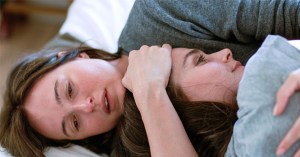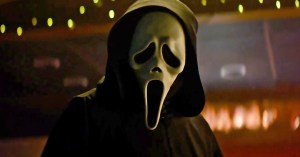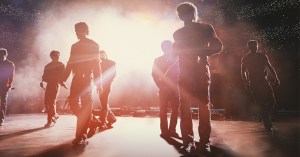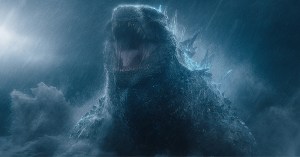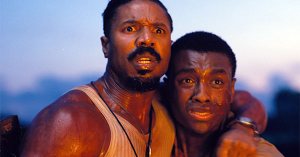Total Recall: Diane Keaton’s Best Movies
We count down the best-reviewed work of the Big Wedding star.
If you’re the type of film fan who goes in for all-star romantic comedy extravaganzas, this weekend’s The Big Wedding could be the cinematic event of the season — a good old-fashioned, light-hearted look at all the horseplay, tomfoolery, and shenanigans that lead up to one bride and groom’s betrothal, with the added bonus of the familiar faces of Robert De Niro, Robin Williams, Susan Sarandon, and Diane Keaton. Cinematic legends, all of them, but this week we’re focusing on Keaton’s contributions, and when you take a look at the amazing array of films she’s appeared in, we think you’ll understand why. Break out your favorite vests, baggy pants, and fedoras — it’s time for Total Recall!
10. Manhattan Murder Mystery
The most recent of the eight films she’s made with Woody Allen, 1993’s Manhattan Murder Mystery, almost didn’t come Keaton’s way; initially, the part of Carol Lipton, an amateur detective whose efforts to solve the mystery of a neighbor’s death draw in her neurotic husband (Allen) and a family friend (Alan Alda), was supposed to go to Allen’s longtime muse Mia Farrow — but when their notorious breakup forced him to find a new leading lady, he reached out to a dependable friend. The result was decidedly one of his more lightweight films, but for quite a few critics, that was part of its affable charm; as Owen Gleiberman wrote for Entertainment Weekly, “Nobody labors quite like Woody Allen to produce a modest entertainment.”
9. Reds
An epic 194-minute biopic about the tortured affair between radical journalists John Reed (Warren Beatty) and Louise Bryan (Keaton) during the early 20th century, set against the backdrop of the Russian Revolution, Reds wasn’t exactly the most commercially friendly film of 1981 — but thanks to positive word of mouth and a stellar cast that also included Jack Nicholson, Paul Sorvino, Gene Hackman, and M. Emmet Walsh, it ended up grossing more than $50 million during its theatrical run, on the way to picking up three Academy Awards (against a dozen nominations). Calling it “Political drama and sweeping romance in one,” Carol Cling of the Las Vegas Review-Journal marveled, “Only Warren Beatty would, or could, do it.”
8. Play It Again, Sam
Woody Allen didn’t direct the 1972 film adaptation of his Broadway hit Play It Again, Sam, but he did star in it and write the screenplay — and he did make sure to bring over Keaton, his leading lady from the stage. While the whole thing still didn’t amount to much more than an affable homage to Casablanca, there’s no denying the strength of that impeccable source material, or the skill and affection with which Sam pays tribute to an assortment of scenes, lines, and characters that every film buff knows by heart. “Maybe the movie has too much coherence, and the plot is too predictable; that’s a weakness of films based on well-made Broadway plays,” admitted Roger Ebert. “Still, that’s hardly a serious complaint about something as funny as Play It Again, Sam.”
7. Manhattan
By the end of the 1970s, Keaton had starred in six Woody Allen films — with the fifth, Annie Hall, sending her home with an Academy Award for Best Actress. She didn’t repeat the feat with their sixth collaboration, 1979’s Manhattan, but it’s safe to say audiences and critics responded to the end result; Allen’s story of a neurotic TV writer character caught in a(n admittedly unlikely-seeming) love triangle between a teenager (Mariel Hemingway) and an intellectual (Keaton) is regarded as one of the high points of his distinguished career. As Vincent Canby wrote for the New York Times when Manhattan was released, “Mr. Allen’s progress as one of our major filmmakers is proceeding so rapidly that we who watch him have to pause occasionally to catch our breath.”
6. Annie Hall
Keaton’s career was already well on its way in 1977, but her turn as the title character in Woody Allen’s Annie Hall rocketed her into Hollywood’s upper echelon, earning her a Best Actress Oscar and heaps of critical accolades for a performance of a character who’d form the (often misunderstood) template for countless quirky-but-lovable leading ladies in subsequent rom-coms. While Keaton’s affinity for the character makes sense, given that Allen constructed it based on what she’s described as an “idealized version” of herself, that doesn’t detract from the sheer winsomeness in the film; as Vincent Canby observed for the New York Times, “There will be discussion about what points in the film coincide with the lives of its two stars, but this, I think, is to detract from and trivialize the achievement of the film, which, at last, puts Woody in the league with the best directors we have.”
5. The Godfather, Part II
In the closing moments of The Godfather, trouble loomed for the marriage of Michael Corleone (Al Pacino) and his wife Kay (Keaton), as Kay watched Michael assume the mantle of his father’s responsibility for their family’s criminal empire in spite of his promise to make their business legal. But that was just foreshadowing for the full-on rupture between the young couple in The Godfather Part II, which finds Kay increasingly hostile toward her husband’s lifestyle — especially after a botched assassination attempt leaves their bedroom riddled with bullet holes. The movie’s silent final moments drive home the price of life as a Corleone, adding an intimate denoument to a sequel that often reaches for — and achieves — epic status. “This film has an even broader scope than the original,” mused Jeffrey M. Anderson for Combustible Celluloid, “but does not fail in its depiction of small, intimate moments and surprising emotional reveals.”
4. Lovers and Other Strangers
After kicking off her stage career with a Tony-nominated performance in Woody Allen’s stage version of Play It Again, Sam, Keaton made a graceful transition to film with a supporting role in Cy Howard’s ensemble dramedy Lovers and Other Strangers, a triple Oscar nominee that united an enormously talented corps of actors (including Richard Castellano, Cloris Leachman, Bea Arthur, and Bonnie Bedelia) to portray the romantic trials and tribulations endured by the friends of one couple (played by Bedelia and Michael Brandon) during the days leading up to their wedding. “This might have been an opening for a good deal of cynicism, but the movie is optimistic at heart,” observed Roger Ebert. “Not optimistic that love can survive unchanged throughout a lifetime, but that love and lovers can occasionally reach an accommodation that is not positively painful.”
3. Love and Death
Between Sleeper and Annie Hall, Keaton and Woody Allen starred in Love and Death, a satire on Russian literature that used the story of a reluctant war hero (Allen) and his equally reluctant bride (Keaton) to offer a cockeyed, tightly scripted take on Tolstoy, Dostoyevsky, and Eisenstein, melding satirical philosophical debates with visual homages only a film buff could truly love — and became one of the more unlikely hits of the 1970s in the process. As Vincent Canby argued for the New York Times, “Besides being one of Woody’s most consistently witty films, Love and Death marks a couple of other advances for Mr. Allen as a film maker and for Miss Keaton as a wickedly funny comedienne.”
2. Sleeper
After making a big splash in 1972 with The Godfather and Play It Again, Sam, Keaton continued her hot streak the following year with Sleeper, a reunion with Sam writer/director Woody Allen that swapped out that film’s Humphrey Bogart pastiche for a futuristic comedy about a health food store owner (Allen) who’s cryogenically frozen after dying during a gall bladder operation, thawed out 200 years later, and becomes an unlikely leader in a resistance movement — while falling in love with the woman who briefly thought he was a robot (Keaton). Mused Filmcritic’s Christopher Null, “Pound for pound and minute for minute, Sleeper may just have more laughs in it than any other Woody Allen movie.”
1. The Godfather
While it wasn’t her first film role, Keaton’s appearance as the future Kay Corleone in Francis Ford Coppola’s The Godfather is generally regarded as her breakout performance — and for good reason, because while it isn’t one of the more substantial parts in her career, Keaton’s work provides a crucial component of the trilogy-to-be’s sprawling, multi-generational saga. It also doesn’t hurt that The Godfather enjoyed blockbuster success, briefly earning the distinction of being the top-grossing film of all time, or that it was impeccably cast overall, employing the talents of James Caan, Robert Duvall, Al Pacino, and Marlon Brando (the latter two of which were nominated for and won Academy Awards) to deliver what TIME’s Jay Cocks praised as “that rarity, a mass entertainment that is also great movie art.”
In case you were wondering, here are Keaton’s top 10 movies according RT users’ scores:
1. The Godfather — 97%
2. The Godfather, Part II — 96%
3. Annie Hall — 92%
4. Manhattan — 91%
5. Love and Death — 88%
6. Play It Again, Sam — 86%
7. Manhattan Murder Mystery — 81%
8. Reds — 80%
9. The Godfather, Part III — 79%
10. Sleeper — 79%
Take a look through Keaton’s complete filmography, as well as the rest of our Total Recall archives. And don’t forget to check out the reviews for The Big Wedding.


